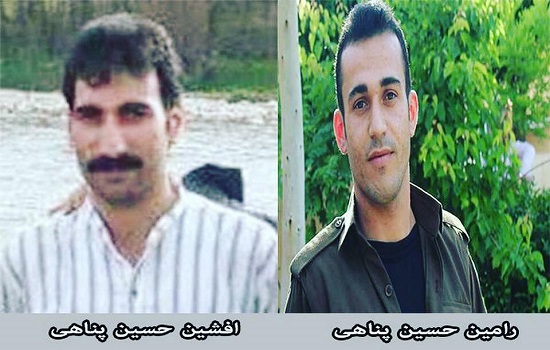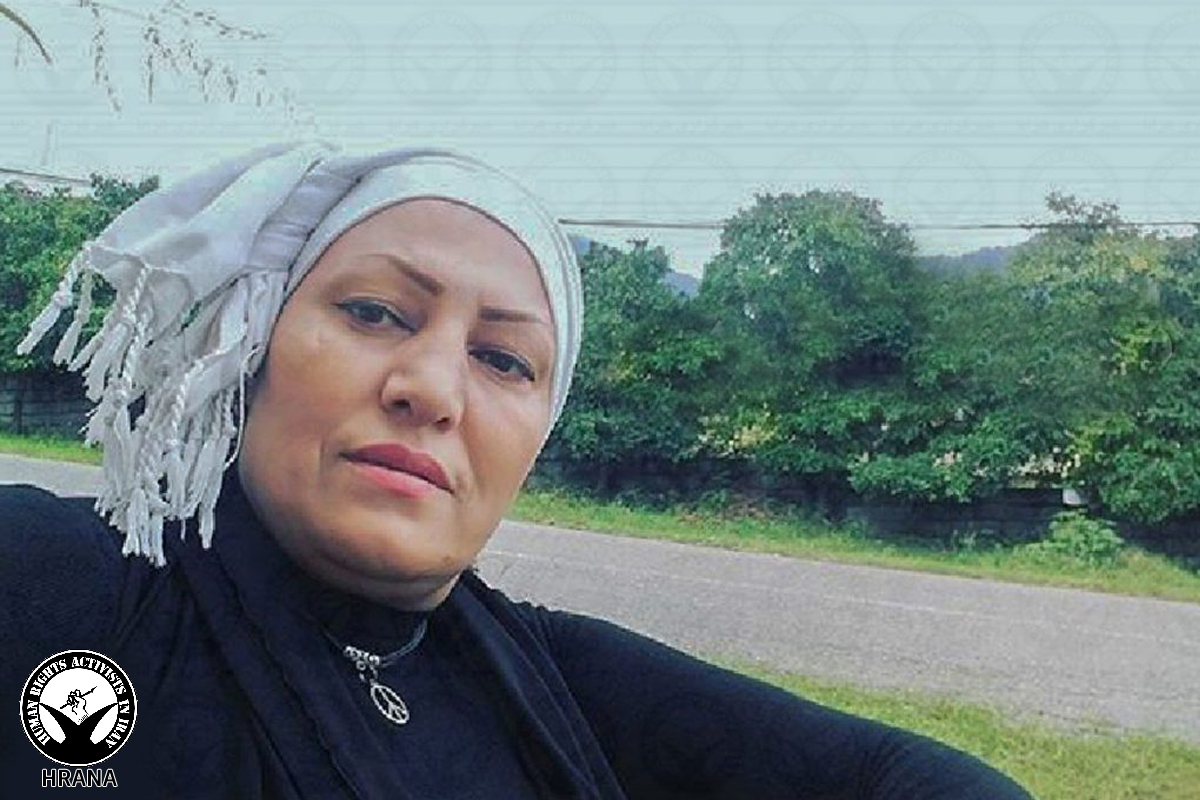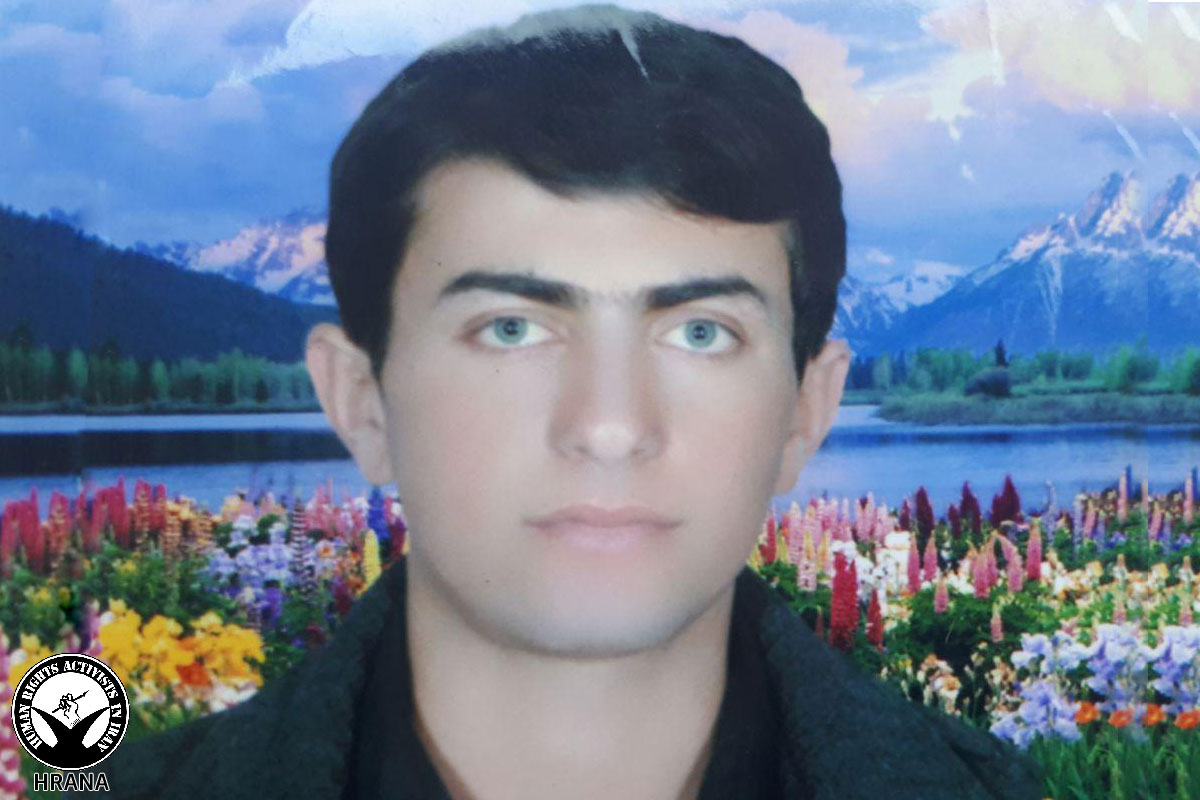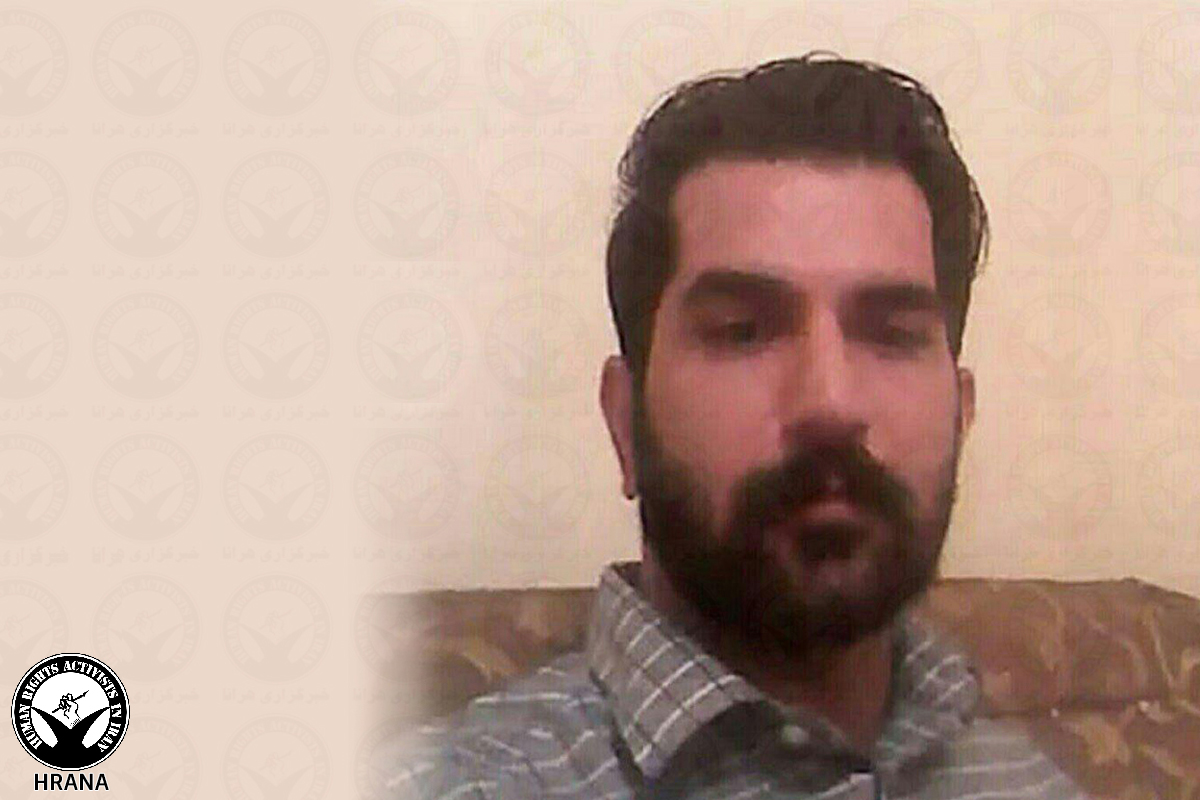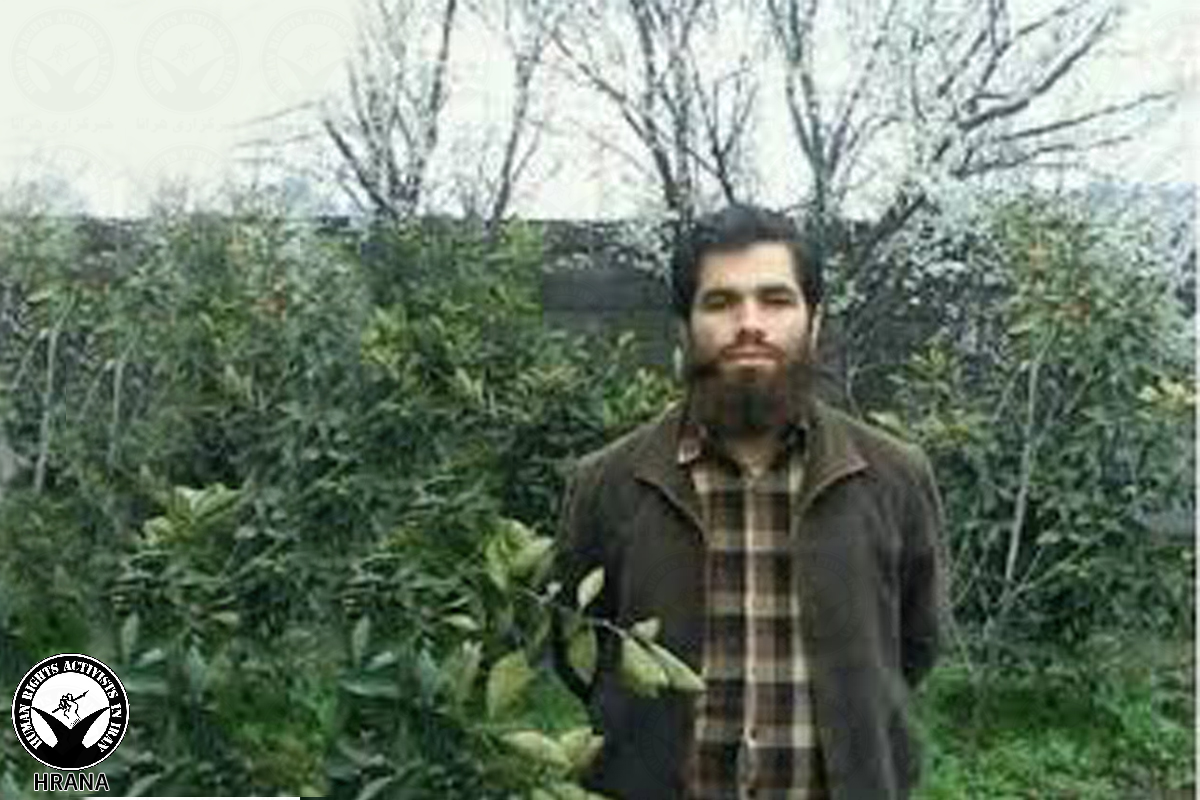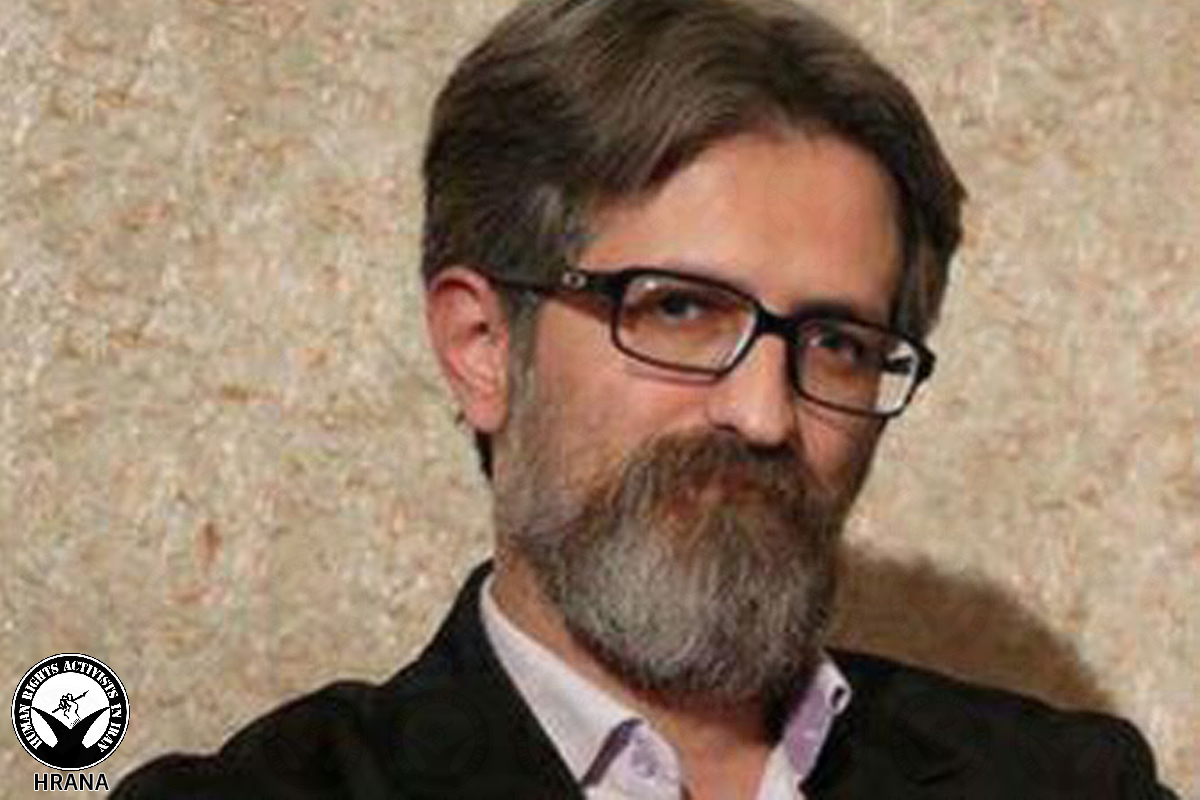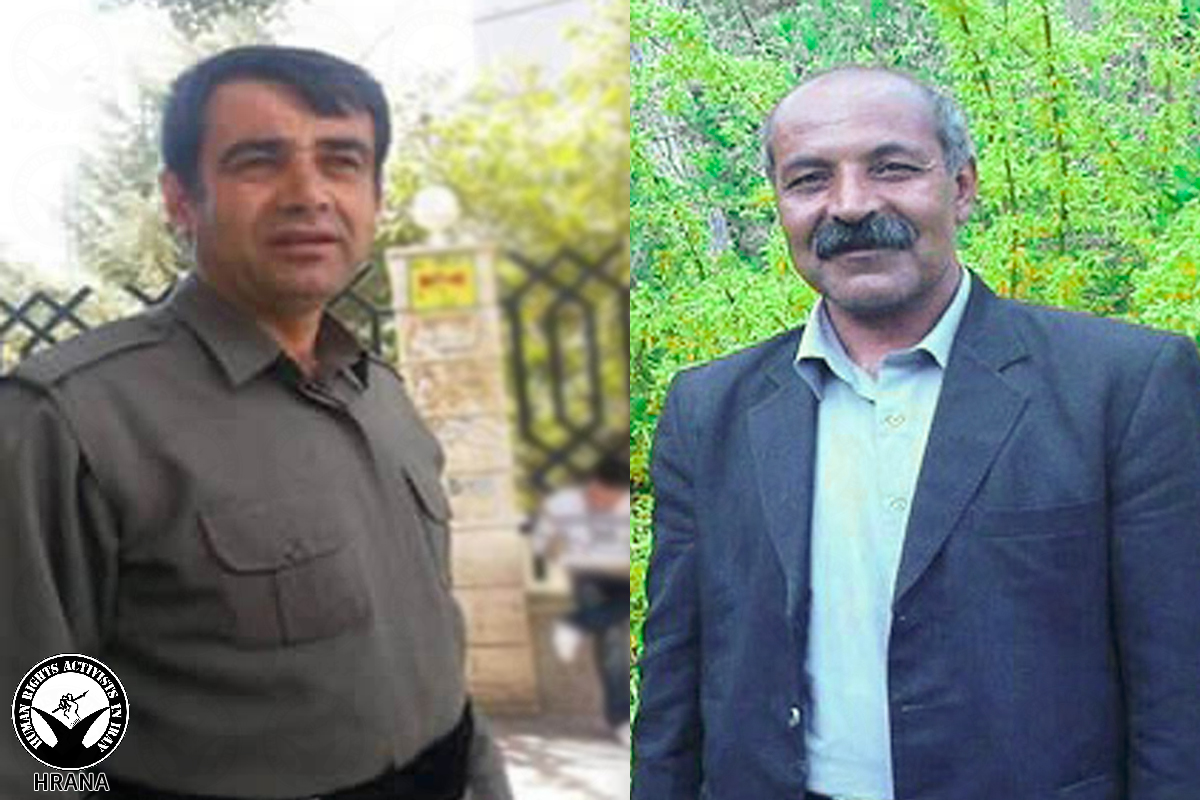Human Rights Activists News Agency (HRANA)- Following the execution of his brother Ramin, political prisoner Afshin Hossein Panahi has expressed his gratitude and solidarity in the form of a letter, addressed to an international community which continues to champion the memory and cause of his late sibling.
At an undisclosed location in Tehran province on September 8th, Ramin Hossein Panahi was hanged to death alongside Zanyar Moradi and Loghman Moradi, without notice to their respective families or lawyers, and pursuant to a legal process on which human rights organizations had already cried foul.
Once the brothers were hanged to death, their families received threatening messages from the Ministry of Intelligence and were refused the right to inter their bodies.
In the wake of these executions, residents and merchants of several Iranian cities where Iran’s Kurdish population is highest– particularly in the provinces of Kurdistan, Kermanshah, and West Azerbaijan –went on a general strike. In response, civil activists in the cities of Sanandaj, Marivan (Kurdistan), Oshnoviyeh, Sardasht (West Azerbaijan), and Ravansar (Kermanshah) have been taken into custody.
Seven political detainees at Evin Prison, including Atena Daemi, Nasrin Sotoudeh, and Golrokh Iraee, have written letters to express their condolence to the families of Moradi, Moradi, and Panahi.
United Nations High Commissioner for Human Rights Michelle Bachelet responded to the executions in the following statement: “I deeply deplore the executions last week of three Iranian Kurdish prisoners despite the serious concerns raised by Special Procedures mandate holders that they were not afforded fair trials, and were subjected to torture.”
Philip Luther, Amnesty International’s Research and Advocacy Director for the Middle East and North Africa, has also condemned these executions.
The full text of Afshin Hossein Panahi’s letter, translated into English by HRANA, is below:
A whisper echoes through the iron labyrinth
It sings, “endure! dawn is upon us!”
To the dear civil rights activists, and political parties and groups both inside and outside Iran,
I am thankful and grateful for your unfaltering efforts and support over the past year in trying to stay the execution of my innocent yet audacious brother.
I have a heavy heart and tearful eyes in my grief over the loss of Ramin, who died with dignity. He was proud to fight for the freedom of those who would *later rise in [his] defense and honor, those who have peacefully troubled the foundation of despotism.
Fettered in prison, I am no free man. Notwithstanding my innocence, and my faith in the righteousness of the freedom march, I suffer pains common to all Iranian civil and political activists, and my demands have become one with theirs. I demand my rights be realized, and I will not rest or falter until they are restored. I am infinitely thankful to those comrades who strive to raise the voice of Iran’s political hostages.
Let it be known that the strength of our pact and the spirit of our fight will prevail.
Afshin Hossein Panahi,
Sanandaj Central Prison
* Referring to the general strike in Kurdish areas of Iran
*************************
Afshin Hossein Panahi is a political activist who was arrested on June 26th, 2017 in his home. He was sentenced to eight and half years in prison by judge Saeedi of Branch one of Sanandaj Revolutionary Court on charges of “disseminating propaganda against the regime” and “collaboration with a Kurdish opposition group through participation in a Nowruz ceremony.” This sentence was upheld in appeals court. He was also arrested in 2011 for inquiring into the suspicious death of another one of his brothers, Ashraf Hossein Panahi. In that case, he was sentenced to one year in prison for “propaganda against the regime.”
Tag: Political Prisoners
January Protests: Third Day of Hunger Strike for Prisoner Mahin-Taj Ahmadpour
Human Rights Activists News Agency (HRANA) – Mahin-Taj Ahmadpour, a political prisoner being held at Nashtaroud Prison of Tunekabon, has been on hunger strike for three days.
For her participation in the January protests in Tunekabon, Ahmadpour was sentenced in the city’s Revolutionary Court, and Branch 101 of its Penal Court, to 10 months in prison. She has been serving her sentence since August 14, 2018.
Ahmadpour declared hunger strike on Monday September 10, 2018 in protest to a lack of medical attention, authorities’ refusal to allow her access to the prison phone, and of prison authorities, who have reportedly threatened to develop a new case file against her.
An informed source elaborated to HRANA, “When they didn’t let Ahmadpour use the phone, it led to an argument. Instead of escalating the matter for handling by authorities, Mrs. Sha’bani the guard got involved, insulting the prisoner and threatening to get prison and security authorities to pursue further charges against her.”
One day after the incident, the guard told Ahmadpour that a new case file had been opened against her, charging her with blasphemy, even while the content of Ahmadpour’s altercation with Sha’bani was reportedly limited to their disagreement over use of the phone.
The source added, “Ahmadpour is anemic, and is supposed to receive seven units of blood every month. Due to her anemia, she has a high chance of developing leukemia and has to receive regular monthly injections as a preventative measure. Despite these conditions and supporting medical documentation, the prison authorities have not permitted her to be transferred to the hospital for her treatments.”
Mahin-Taj Ahmadpour is a 46-year-old resident of Tunekabon. A peddler by trade, she was arrested along with 14 other residents during the January 2018 countrywide rallies known as the January Protests. The Revolutionary Court of Tunekabon sentenced eight of these arrestees to 28 months’ imprisonment, divided among the defendants. Branch 101 of Criminal Court No. 2 of Tunekabon, presided by Judge Ebrahimi, also sentenced six of the arrestees to 24 collective months of prison time.
Ahmadpour was sentenced May 2, 2018 in Branch 101 of Tunekabon Criminal Court No. 2 to serve six-months prison sentence on a charge of “disrupting the public peace through participation in an illegal gathering.” On August 11, 2018, Tunekabon’s Revolutionary Court compounded the sentence with four months’ imprisonment for “propaganda against the regime.” As evidence against her, the court cited a combination of law enforcement reports and images and video taken during the January protests in Tunekabon.
Tensions Mount over Unlawful Execution of Three Kurdish Political Prisoners
Human Rights Activists News Agency (HRANA)- Shock, sorrow, and censure over the executions of Zanyar Moradi, Loghman Moradi, and Ramin Hossein Panahi continue to pour in from both international institutions and Iranian citizens in-country, further straining relations between Iranian authorities and the human rights activist community at large.
A number of Kurdish opposition groups have sounded the call to strike to Kurdish regions of Iran, inviting fellow Kurds to protest their comrades’ executions.
Michelle Bachelet, United Nations High Commissioner for Human Rights, has stated, “I deeply deplore the executions last week of three Iranian Kurdish prisoners despite the serious concerns raised by Special Procedures mandate holders that they were not afforded fair trials, and were subjected to torture.” Philip Luther, Amnesty International’s Research and Advocacy Director for the Middle East and North Africa, has also condemned these executions.
Imprisoned civil rights activist Atena Daemi was among a number of imprisoned civil rights activists publishing separate letters expressing sorrow and outrage over the men’s deaths. Golrokh Iraee and Human Rights Lawyer Nasrin Sotoudeh, two more imprisoned activists, wrote and published their own messages of protest and sympathy, with Sotoudeh likening their executions to the *political massacres of 1988.
Some of these letters have reportedly incited blowback from prison authorities, who have subjected Daemi and Iraee to repeated non-routine body searches after their letters were published. When these women inquired about the reason for the searches, they learned the order for frisking had been issued by the Prison’s Director. A Prosecutor Assistant has since promised to investigate.
Excerpts from the letters of Sotoudeh and Iraee, translated into English by HRANA, are below.
Nasrin Sotoudeh:
“The judicial system has executed three Kurdish compatriots. Our Kurdish compatriots have been plagued by oppression for decades. The verdict and sentences of the Revolutionary Court, condemning these three compatriots to die, was the product of an unlawful process that runs counter to Human Rights principles and the laws of the Islamic Republic. In at least one of these trials, had due process been respected, the defendant may very well have been acquitted.
Zanyar and Loghman Moradi were on hunger strike when they were hanged, another testament to the inherent brutality of the judicial system, who itself is supposed to protect us from violence.
I extend my condolences to our Kurdish compatriots, who have had a steadfast, crucial presence in the cultural promotion of Iran; to all Iranians; and, in particular, to the families of Moradi, Moradi, and Panahi. I hope that in heeding the diverse manifestations of Iran’s judicial violence, the urgent need to renounce all forms of it will become clear.”
Golrokh Iraee
“[Their death] invites the wrath of Kurdistan’s Children […] Zanyar Moradi, Loghman Moradi, and Ramin Hossein Panahi, freedom fighters, Kurdistan’s immortal resistance, teachers of patience and persistence, have left behind a lesson in determination. They were hanged while on hunger strike, in protest of their mistreatment at the hands of authorities; they stood up to the monsters of despotism and reactionarism.
They unmasked those traitors who call themselves statesmen and rulers. Let it be known that the time for lip service has passed. To hold them accountable, we must act.”
****
After being hanged to death in an undisclosed location in Tehran on September 8th without notice to their lawyers, the bodies of the Moradis and Hossein Panahi were *confiscated by the Iranian authorities. The Ministry of Intelligence has since threatened the men’s surviving family members.
Ahmad Amouee, journalist and former prisoner of conscience, published an account of the Moradi and Moradi families’ visit to Tehran’s main cemetery, Behesht-e Zahra, where officials had summoned them to bid farewell to their sons’ bodies. Their final resting place remains unknown.
* In the summer of 1988, on the orders of Ayatollah Khomeini, the Supreme Leader of Iran at the time, thousands of prisoners of conscience and political prisoners were executed after inquisition-style interrogation sessions. Almost all of these prisoners had already been tried and were either serving their sentence or, having completed their sentence, were awaiting release. All were buried in unmarked, often secret, mass graves.
Prisoner of Conscience Atena Daemi Rebukes Authorities, Eulogizes Executed Kurds
Human Rights Activists News Agency (HRANA) – From the walls of Evin Prison, detained civil rights activist Atena Daemi has written a letter in response to the executions of Ramin Hossein Panahi, Loghman Moradi, and Zanyar Moradi, three Iranian Kurdish political prisoners who were hanged to death in secret on Saturday, September 8th.
The executions of the Moradis and Panahi drew outrcry from human rights institutions internationally. The attorneys representing them called their convictions and executions — the latter which took place without the mandatory notice to, or presence of, their lawyers — legally ambiguous under both Iranian and international law. Caught unawares, none of the families were present during their sons’ final moments, as the executions were carried out at an undisclosed location in Tehran. The Ministry of Intelligence has since issued detention threats to the family members of the deceased men.
Condemning Iranian authorities for their treatment of the three men, and extending her condolences to their families, Atena Daemi’s letter joins the many voices of outrage over the course of the young mens’ fate. Daemi, imprisoned since 2014, is serving a seven-year sentence for “propaganda against the regime,” “assembly and collusion to act against national security,” and “insulting the supreme leader [Ayatollah Khamenei] as well as the founder of the Islamic Republic, Ayatollah Khomeini.”

The text of Atena Daemi’s eulogy, translated into English by HRANA, is below:
They killed our loved ones, and claim with pride that in doing so they have administered justice.
The “justice” they refer to is not the one represented by Lady Justice holding a fair and balanced scale. It is instead a man — a man with a turban on his head [a cleric], whose forehead bears the mark of the clay which grazes his head during prayers. He is blindfolded, not as a sign of impartiality, but of blindness to the truth. In one hand is a rosary. In the other, a scale suspended by a noose.
These scales are so unbalanced that one tray is a speck in the heavens, while the other is laden with dead bodies dragging it deep into the ground. This “justice” they invoke has been neither seen nor heard in *40 years.
In this troubled time – a time of economic turbulence, poverty, and unemployment – what problem was solved by murdering these three beloved men? Has their killing soothed any of the ailments suffered by the Iranian people?
Your majesties– where is this mania taking you? By deceit and without warning, you led our loved ones to the killing fields. Even in the short lives granted them, you wouldn’t offer them peace. While they were still **hungry and thirsty, you cut their lives short. How it must have incensed you to your core to never see them falter. As you, dry-eyed, pitied them in their walk to the gallows to die for the ideals, their heads were held high, their steps steady…
How insolently you watch our loved ones draw their last breaths! It must burn you to hold them hostage from their families and brand them as terrorists, only to see them rise as steadfast symbols of democracy for the rest of us. For nine years, they showed friendship to inmates of different creeds and beliefs; they were endeared to their fellow prisoners, loved by us, and cherished by the Iranian people.
Before the start of religious months of Moharram and Safar(1) each year, you prepare yourself for mourning with a savage display. Drunk and armed with handguns, you launch into a monologue about Imam Hussein, who, lips dry from thirst, was beheaded by Yazid. What a repugnant contradiction–what abhorrent hypocrisy! You mirror Yazid’s troops, and for the past 40 years, you have tightened ropes around resolute throats, pulled the stool from beneath the feet of persistent and patient youth. You instigate sectarian war between Sunni and Shiites. Then, your pockets brimming with billions, you pretend to be mourning Hussain.
I am sure that you know your savage acts only dig you deeper into public contempt. Your path is one of self-annihilation. Today, you only dug your graves deeper. You did not kill Zanyar, Loghman, and Ramin. You have only endeared them in our hearts, inspiring the world into mourning the true martyrs of our time.
You have tarnished Iran’s standing and dignity in the world. They see us as a terrorist country for the cutthroat, blood-thirsty, and rapacious actions of a select and powerful few. How long and how far will you continue on this road? Dream on about imposing war on your people: they will rise to the challenge again and again. Stop your killing machine. Lift your lead boots from the throats of Iran and Kurdistan.
How tightly you cling to your towering throne, oblivious to the fact that you could tumble from your high horses at any moment to the miry earth below. Throughout history, many who rode high thought of themselves as invincible, only to take refuge in sewage tunnels, where they were tracked down and punished for their crimes.
Iran is a pile of live embers cloaked in a thin layer of ash. Lest your actions arouse the flames that lie beneath.
We congratulate the steadfast families of these martyrs.
Atena Daemi – Evin Prison Women Ward
September 8th, 2018
(1) Months in the Islamic lunar calendar commemorated by Shiite Muslims in mourning of Imam Hussein, the 3rd Shiite Imam, who was killed in battle against Yazid (Imam Hussain has come to symbolize the force of Good while Yazid stands for Evil).
* The Islamic Republic of Iran was founded after the Iranian Revolution approximately 40 years ago
** Zanyar and Loghman Moradi and Ramin Hossein Panahi were all reportedly on hunger strike before they were executed.
Naqadeh Farmer Arrested by Revolutionary Guards
Human Rights Activists News Agency (HRANA) – A farmer from the village of Kooyik in Naqadeh county, West Azerbaijan Province was arrested on September 2nd.
Saadi Maroof Khalkhaaneh, 23, was arrested by authorities from the Intelligence Unit of the Iranian Revolutionary Guard Corps (IRGC) and transported to an unidentified location.
A source close to the family confirmed the news to HRANA, stating Saadi was accused of “backing opposition parties” and detained without an arrest order.
In repeated inquiries about him to security authorities, the source said, Khalkhaaneh’s family has been met with the stock response that he is “in IRGC custody.” His whereabouts remain unknown.
Outcry against Secret Executions of Zanyar & Loghman Moradi and Ramin Hossein Panahi
Human Rights Activists News Agency (HRANA) – Three Kurdish political prisoners now lay buried in an undisclosed location after being executed in secret on September 8th on murder charges never proven in Tehran criminal court, sparking outrage from their families, attorneys, and the human rights community at large.
Without notifying their lawyers or loved ones, prison authorities hanged to death Zanyar Moradi, Loghman Moradi, and Ramin Hossein Panahi, contravening [both Iranian and international law] by seizing and interring their bodies in a location yet unknown to their families, who were put on guard by the Ministry of Intelligence not to speak up about the incident. Hossein Panahi’s brother Amjad confirmed this to HRANA.
While initial reports by Iranian official sources indicated the executions took place in Rajai Shahr (Gohardasht) Prison in Karaj–the capital of Alborz province about 30 miles west of Tehran, where Hossein Panahi and the Moradis were last known to be held–the Tehran Prosecutor’s Office recently indicated in a statement that they were executed “in Tehran,” accusing the deceased men of violent crimes while withholding further details about their deaths or remains.
Hossein Panahi’s lawyer Hossein Ahmadiniaz stated that the execution of the three young men was not only abrupt– it was also unlawful on several counts.
“Based on an amendment to section 478 of Criminal Procedure Law, once a request for retrial has been submitted on behalf of defendants charged with offenses punishable by death, the execution of the sentence must be stayed. Moreover, once a request for clemency is registered with the Clemency & Forgiveness Commission, the execution must be immediately stayed.”
According to Ahmadiniaz, the transfer of the prisoners from Sanandaj [300 miles west of Tehran] to Karaj [on the western outskirts of Tehran], preventing Hossein Panahi’s legal team from conferencing with him, was enough in itself to establish authorities’ disregard of the law. Ahmadiniaz’s statements are backed by Saleh Nikbakht, the lawyer representing Zanyar and Loghman Moradi, who has published documents (pictured) demonstrating that the judiciary’s investigation into his client’s murder charges was far from complete.
Ahmadiniaz went on, “As Ramin’s Hossein Panahi’s legal team, we declare his innocence, and the unlawful and irreligious nature of the verdict and sentence against him […]. Panahi was subjected to an unfair procedure devoid of due process. He was the victim of a political trial. My heart goes out to Hossein Panahi’s family, and I offer them my condolences. I consider the execution of Ramin Hossein Panahi a firebrand of hatred and calamity, and condemn it in the strongest sense of the word.”
The families of Panahi and the Moradis had been abruptly called in for a visit with their imprisoned loved ones on September 7th, raising the specter of their imminent execution. That night, Nikbakht explains, he went to [Rajai Shahr Prison] where he stood guard from midnight to 6 a.m. alongside Loghman’s father, a number of other Moradi family members, and group of civil activists.
“The agents there first told us that [the prisoners] had been handed to Ministry of Intelligence authorities, and gave us no further information about their fate,” Ahmadiniaz related to HRANA. “We followed up on their indications by heading to the Alborz Intelligence Office, where we were told over an intercom that the Moradis were not there, and that we should go back to [Rajai Shahr]. Finally, a prison official emerged at around 4:30 a.m. to say that the prison isn’t the sentence executioner, and that they were unaware of the prisoners’ whereabouts as of their transfer to the Intelligence Ministry. With confidence, he told us that the execution had not taken place in that prison.”
Nikbakht also bemoaned misinformation being disseminated about his clients’ ordeal. “A news agency announced today [Saturday, September 8th] at 2:51 p.m. that these executions were carried out in the presence of the lawyers. This claim, at least in case of [the Moradis], is fundamentally false. I am their lawyer[…] and neither their families nor I had any knowledge of how or where the execution took place.”

An excerpt of Nikbakht’s defense statement, translated into English by HRANA, is below.
My clients had two cases–one on a charge of Moharebeh (enmity against God), for which a death sentence was handed down and confirmed [by the Supreme Court]. Their lawyer in this case was from Marivan [of Kurdistan Province in western Iran]. The second case involved the assassination of three Salafis in Marivan, which was being investigated in Branch 4 of Tehran Criminal Court. I took over the case in March 2013. In the first day of trial on July 23rd, 2014, I raised objections to the claim that my clients were responsible for the three murders in question. Some of my objections were as follows:
· Lack of a report detailing reconstruction of the crime scene
· Lack of evidence of their involvement in the murder
· Lack of a murder weapon
· Lack of efforts on the part of authorities to locate the murder weapon
In my clients’ case file, they were quoted as saying that they disposed of the murder weapon in Marivan lake. This section of the lake in question is 2 to 5 meters deep, a depth at which even a cursory search would have recovered the murder weapon. The only evidence against my clients was their confession. The defendants have protested the veracity of this confession. Specifically, after they were transferred from solitary confinement in Sanandaj and Evin prisons to Rajai Shahr’s [general ward], they wrote a detailed letter to the Head of the Judiciary explaining how their confessions had been extracted. There was no evidence to prove they had committed the murder. Branch 4 of Tehran Criminal Court (Previously Branch 74) sent the case to Branch 27 of Tehran Criminal Investigation, which, in turn, sent the case to Marivan Court, who were to complete the investigation. Following a few back and forths, I was told that neither new evidence nor the murder weapon had been found, and that they ultimately sent the case back to Tehran without addressing the flaws in the case.
There has been no new hearing since the discovery of flaws in the case during the first court session, and the charge of murdering three Salafis was never substantiated. On the day of the murder, Loghman, who was fingered as an accomplice, was working on a crane on a construction site in Sarvabad, 35 km [20 miles] from Marivan. He only returned to Marivan an hour and half after the murder occurred.
[…] What’s more, the right of the murder victims’ family supersedes that of God (and the state) in religious law. It was unlawful to execute them for “Moharebeh,” a crime against God [and state], before first addressing the death sentence for murder. The documents below are from the Judiciary’s electronic information center, and show the murder charges were still pending investigation and trial.”
International Reaction
Philip Luther, Amnesty International’s Research and Advocacy Director for the Middle East and North Africa, released a statement in response to the executions of Zanyar Moradi, Loghman Moradi, and Ramin Hossein Panahi. The full text of his statement is below.
“We are horrified by the news that the Iranian authorities have executed these men, despite widespread condemnation of their death sentences, and calls from UN human rights experts and other bodies to halt their executions.
The trials of all three men were grossly unfair. All were denied access to their lawyers and families after their arrest, and all said they were tortured into making “confessions”. In sentencing them to death despite these massive failings in due process, the Iranian authorities have once again demonstrated their brazen disregard for the right to life. We call on the international community to strongly condemn these executions and urge the Iranian authorities to respect their obligations under international law. The Iranian authorities must take steps to ensure that everyone has a fair trial, that torture and other ill-treatment are absolutely prohibited, and that the practice of forced ‘confessions’ is stopped once and for all. They must also immediately impose an official moratorium on executions with a view to abolishing the death penalty.”
Dervish Hunger Striker Transferred to Prison Clinic
Human Rights Activists News Agency (HRANA) – Mojtaba Biranvand, a Dervish prisoner who went on hunger strike after being attacked by prison officials in the Great Tehran Penitentiary, was transferred to the prison’s clinic on September 7, 2018, after experiencing a steep drop in blood pressure.
Steadfast to the terms of his hunger strike, Biranvand has declined both intravenous treatment and transfer to an outside hospital. He was moved to declare a hunger strike after he and his comrades were violently raided by prison guards during a sit-in protest and transferred to solitary confinement cells. HRANA previously published an open letter from the Dervish prisoners outlining their terms of protest.
As punishment for his participation in protests against the restrictive measures imposed on Gonabadi Dervish spiritual leader Noor Ali Tabandeh, Biranvand was previously sentenced to seven years in prison and two years in exile, to be served in the southeastern province of Sistan & Baluchestan.
Authorities Unforthcoming on Status of Sunni Prisoner
Human Rights Activists News Agency (HRANA) Since Sunni prisoner Hafiz Tawhid Quraishi was taken in ambiguous circumstances last month to the Detention Center of the Ministry of Intelligence, his family has remained in suspense over his wellbeing.
An informed source told HRANA that Quraishi’s wife and father were insulted and thrown out of Evin Prison’s Prosecution Office when they attempted on September 1st to arrange a visit with him there. “Prison officials told Quraishi’s family that he didn’t have the right to visits,” the source added.
Quraishi had five months left of his sentence at Rajai Shahr Prison in Karaj when around 80 of the prison’s Special Forces, accompanied by intelligence officers, launched an attack on the Sunni quarters of the prison (Hall 21 of Detention Center 7), injuring a number of prisoners and destroying or confiscating their personal property.
An informed source confirmed that Quraishi was then transferred to Evin Prison’s Ward 209, where the Ministry of Intelligence Detention Center is housed.
The radio silence from authorities thus far on Quraishi’s case has his family concerned about his fate, and the possibility that authorities are working to prevent his release by developing another case against him.
Mawlavi Hafiz Tawhid Quraishi, a resident of Talesh, was arrested in September of 2014 and tried one year later. He was initially sentenced to ten years’ imprisonment, which was reduced to seven years in an appeals court.
Update on Mostafa Daneshjoo: Evin Prison Authorities Won’t Budge on Medical Blockade
Human Rights Activists News Agency (HRANA) – Mostafa Daneshjoo, an attorney, is currently serving prison time for his legal advocacy and defense of the Gonabadi Dervishes, a religious minority. These days, Daneshjoo is sacrificing more than his freedom: he is now being forced to sacrifice his health.
Daneshjoo, despite suffering from acute lung and heart disease, has been barred access to medical attention of any kind since he was arrested on July 7, 2018.
According to Majzooban Noor, the Gonabadi Dervish Community News Website, when Daneshjoo was first detained, his family was cut off from contact with him for months. When they were finally permitted to see him in Ward 4 of Evin Prison, their relief was mingled with shock at the sight of his severely declining health.
Mostafa Daneshjoo is the former managing director of the Majzooban Noor website. While the clinic at Evin Prison has Daneshjoo’s medical file on hand, authorities–citing Daneshjoo’s prior arrest–are preventing him from seeking help, even from the generalists at the Evin Prison Clinic.
Daneshjoo was arrested in his mother’s home by seven armed officers in the early morning of July 7th. After spending 45 days in solitary confinement in Ward 209 of the Ministry of Intelligence detention center, he was transferred to Evin’s Quarantine Ward before being taken to Ward 4, typically reserved for prisoners with financial charges. Daneshjoo, who is asthmatic, experienced a sharp increase in symptoms after spending 45 days in a solitary cell without ventilation. While he was taken to Taleqani Hospital on July 21st, he was turned away without receiving care within a few hours.
Daneshjoo’s case file indicates that his current arrest warrant was issued by Branch 3 of the Shahid Moghaddas Prosecutor’s Office in Evin Prison. In a phone conversation at the time, he explained he was being pursued by authorities for his affiliation with the Dervishes who were involved in the Golestan Haftom incident. Authorities have reportedly wielded further punitive measures against him, according to a letter published in May 2017 by the Azad University Security Office, which announced that Daneshjoo was being prevented from pursuing his graduate studies in Penal Law and Criminology.
During prior defense proceedings of a number of Gonabadi Dervishes, following punitive reports from Iranian security agencies, Daneshjoo’s licence to practice law was revoked. He was sentenced — along with other attorneys, Dervish advocates, and his Majzooban Noor co-managers– to imprisonment on charges of “Membership in the Dervish anti-security sect,” “Acting against national security,” “Propaganda against the regime,” and “Disrupting public opinion.” Between 2011 and 2015, he served his sentence in Ward 350 of Evin Prison and was released in May 2015.
Labor Activists Arrested in Western Iran
Human Rights Activists News Agency (HRANA) On Tuesday, September 4, 2018, two labor activists living in Sanandaj (capital of Kurdistan province in Iran) were detained by security forces and taken to an undisclosed location, a close source told HRANA. The source identified the activists as Khaled Hosseini and Mozafar Salehnia.
Hosseini and Salehnia were among five labor activists who were summoned to Branch One of Sanandaj Revolutionary Court on April 28, 2018, shortly before International Workers’ Day (May 1st).
They were previously interrogated on March 5, 2017, by Branch 4 of the Sanandaj Revolutionary Court for taking part in a Nowruz (Persian New Year) festival organized by a workers’ council in Pardis Hall of Sanandaj.



